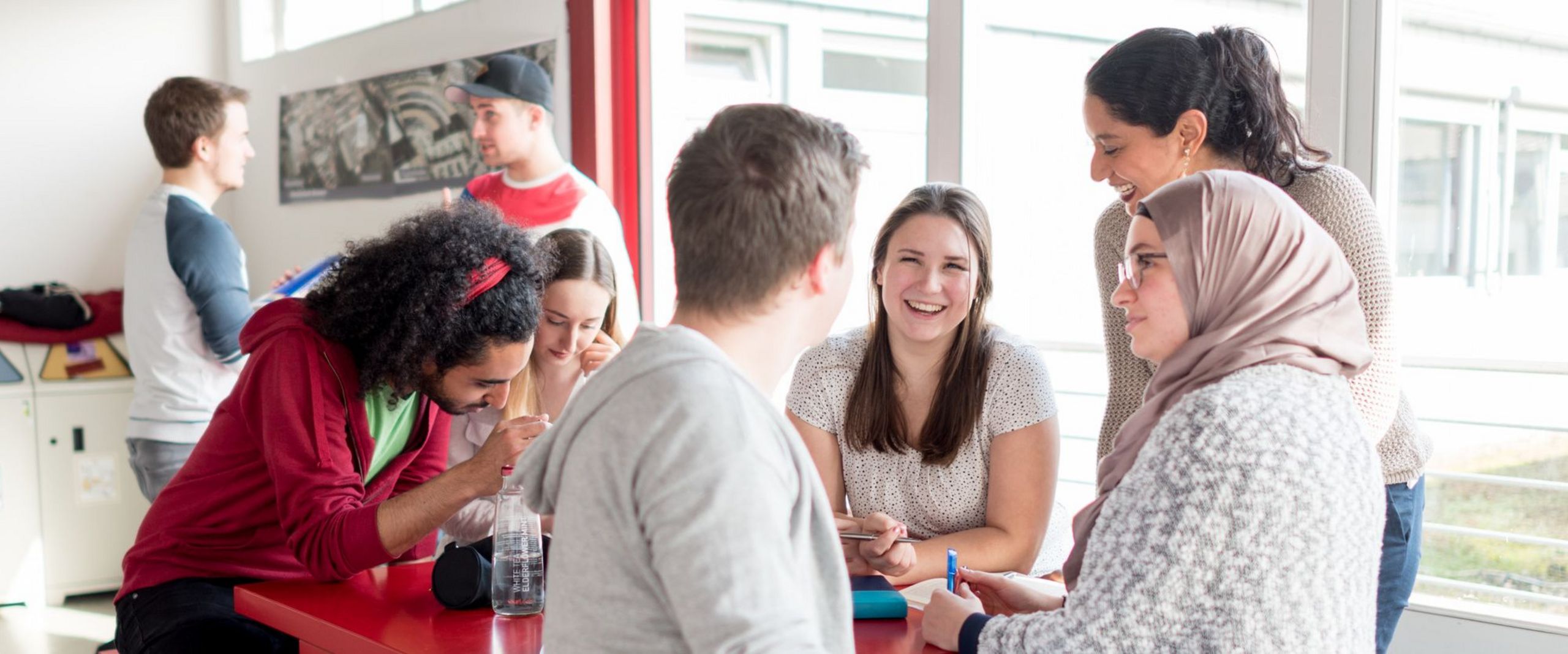
School of Social Sciences
| Degree | Bachelor of Arts |
|---|---|
| Start of study | Winter semester |
| Application period Winter semester | 01 June until 15 July |
| Standard period of study | 7 semesters |
| Credits | 210 |
| Accredited | Yes
|
| Admission restricted | Yes |
| Admission requirements |
|
| Language of instruction | German |
| Faculty/institution | School of Social Sciences |
| Integrated stay abroad | No |
Do you enjoy working with people and want to make a worthwhile contribution to the society you live in? Then our Social Work B.A. degree programme is probably just right for you.
The generalist orientation of the degree programme is excellent preparation for subsequent professional practice in which the increasing complexity of social problems impacts on virtually all individual fields of activity. The broadly based professional competences acquired meet the need to adopt a holistic perception of the individual addressees including their social relations and networks, while taking into account socio-spatial conditions.
One of the main aims is to understand the need for flexibility in the analysis of the problems, resources and the development potential of the people you will one day be dealing with. After completing the programme, you will be able to work with individuals, families, social groups and communities on the basis of academically framed standards and professional ethics in a way that advances social development and social cohesion, while at the same time promoting people's autonomy and self-determination.
The Social Work B.A. programme is characterised by a strong connection to the practice of social work in the region, which is reflected in the good cooperation with practitioners, some of whom will actually be your lecturers. Moreover, the degree is based on the professional and ethical premises of the International Federation of Social Work and maintains diverse international networks, which provide excellent sources of cooperation for placements abroad, reciprocal teaching visits and events such as the ‘International University Week’.
The demand for social workers is currently very high. The career prospects are accordingly very good and include various offers at public and private bodies in the areas of political education, civil initiatives and associations (e.g. parents' initiatives, sponsoring bodies) or in companies. Self-employment (e.g. court-ordered supervision) is also possible. The fields and areas of professional activity are diverse. Here are just a few examples
The majority of students stay in the region after graduation and can enjoy very good job prospects here. But the career prospects for social workers look equally good elsewhere.
After 7 semesters, all students receive the first professional qualification ‘Bachelor of Arts’. In order to obtain state recognition as a social worker, students must complete a year in practice following the Bachelor's programme. The authority responsible for this in Bremen is the Senator for Children and Education.
With the B.A. degree and subsequent state recognition, there are various opportunities for advancement (including management positions) within the various fields of activity. In addition, there is the possibility of taking up a Master's programme upon successful completion. The HSB also offers the degree programme ‘Practice Research and Innovation in Social Work M. A.’.
Ongoing processes of internationalisation, transnationalisation and globalisation influence social work in a central way. Social problems are not only local, regional and national, but increasingly influenced by international factors. Life, communication and economic worlds are increasingly intertwined transnationally, migration history is shaped individually and collectively, and social security systems are influenced by European and global actors, legislation and declarations.
In line with the guiding model ‘Internationalisation at Home’, the international perspective is a central cross-sectional task in the degree programme, which is a member of ‘SocNet98 – European Network of Universities/Schools of Social Work’. This enables the funding of stays abroad for students (possibly with a subsequent work placement) as well as guest residencies for lecturers at the participating universities.
The programme has particularly close links with the following partner universities: Bournemouth (England), Ceske Budeovice (Czech Republic), Edinburgh (Scotland), Figeac/Toulouse (France), Girona (Spain), Groningen (Netherlands), Hasselt (Belgium), Helsinki (Finland), Jihlava (Czech Republic), Leuven (Belgium), Linz (Austria), Nitra (Slovak Republic), Odense (Denmark), Porsgrunn (Norway), St. Pölten (Austria), Emden (Germany), Jena (Germany).
In addition, the following elements are realised:
- Annual SocNet98 International University Weeks with 16 European partner universities from the ‘SocNet98’ network, which are attended by students and lecturers:
- For 2026, IUWs are planned from 20 - 24 April in Helsinki, Groningen, Hasselt, Jena
- In 2025, IUWs took place from 31 March - 4 April in Bremen, Porsgrunn, St. Pölten, Nitra
- In 2024, IUWs took place in Odense, Leuven, Jihlava
- In 2023, IUWs took place in Ceske Budejovice, Linz, Emden
- In 2022, IUWs took place in Girona, Porsgrunn, Hasselt, St. Pölten
- In 2021, IUWs took place in Bremen, Turku, Odense
- In 2020, the IUWs could not be held due to the impacts of the Covid-19-Pandemic
- In 2019, IUWs took place in St. Pölten, Hasselt, Ceske Budejovice
- In 2018, IUWs took place in Bremen, Bournemouth, Porsgrunn, Jena
- In 2017, IUWs took place in Helsinki, Groningen, Leuven, Linz
- Curricularly anchored international activities with partner universities, such as educational stays of student groups at the Marmara University in Istanbul or at the Hanzehogeschool in Groningen.
- The study of international social work and global learning (Module 2.5) enables international and intercultural cooperation in research, science and practice.
- The practical placement in the fifth semester can be organised as a semester abroad.
- The 6th semester is also particularly suitable as a semester abroad (mobility window). Before students go abroad, the proposed study components are examined to see if they will be eligible for the recognition of credits.
The study programme in Bremen includes three practical phases.
A pre-study work placement (13 weeks) as a prerequisite for admission.
A practical semester, which comprises at least 540 hours and is integrated into the study programme (4th semester preparation, 5th semester implementation and 6th semester follow-up of the practical semester). The aim is to observe, test and reflect on professional action in practice on the basis of the knowledge of theory and methods acquired up to that point. The practical semester can also take place abroad.
A probationary year: state recognition is awarded in Bremen after the probationary year (8th and 9th semester) by the senatorial department for labour, women, health, youth and social affairs.
Check the application deadlines and admission requirements for your desired degree programme.
Questions about the degree programme can be answered by the contact persons on the degree programme pages. If you have any further questions about your decision to study at HSB, our advisory and service institutions will be happy to help.

Prof. Dr. Antje Krueger
Professorin für Soziale Arbeit in der Migrationsgesellschaft
+49 421 5905 2773
Email
